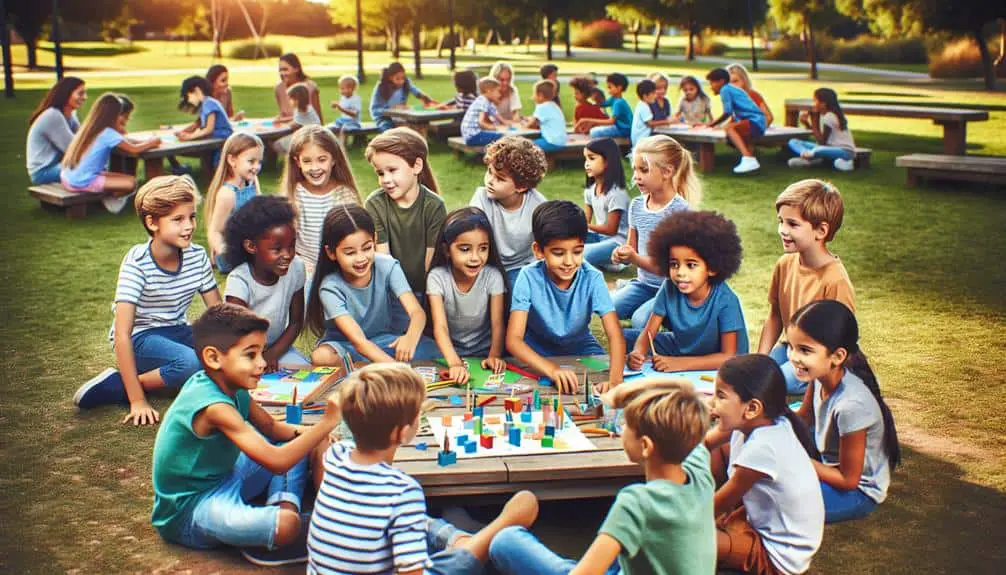To support socialization in homeschooling, involve yourself in your child's social journey. Engage in community activities for diverse experiences. Plan playdates and join extracurriculars to foster interactions. Encourage teamwork through group activities. Cultivate peer connections within homeschool communities for a sense of belonging. Integrate social-emotional learning for emotional intelligence. Overcome challenges with parental involvement and seek online support resources. Remember, crafting a thorough socialization guide for homeschooling entails a blend of real-life experiences, peer connections, emotional growth, and overcoming obstacles.
Key Points
- Encourage group activities for teamwork and communication skills.
- Participate in community events to foster social interactions.
- Incorporate social-emotional learning into the curriculum.
- Seek peer connections within homeschool communities.
- Address challenges promptly with parental involvement and online resources.
Understanding Socialization Concerns in Homeschooling
When homeschooling, parents often face concerns about how their children will develop social skills and interact with peers outside of a traditional school setting. Parent involvement is essential in addressing these concerns. Engaging in community activities and seeking out opportunities for socialization can greatly benefit homeschooled children. Parents can facilitate social interactions by organizing playdates, joining homeschooling co-ops or support groups, and enrolling their children in extracurricular activities like sports teams or clubs.
Community engagement plays an important role in providing homeschooled children with diverse social experiences. Participating in community events, volunteering, or attending local gatherings can help children develop interpersonal skills and build relationships outside of their immediate family circle. Additionally, exploring cultural institutions such as museums, libraries, and community centers can broaden a child's social horizon and create opportunities for meaningful interactions with others.
Building Social Skills Through Real-Life Experiences
Interested in enhancing your child's social skills through real-life experiences? One effective way to achieve this is by engaging in outdoor activities and encouraging group interactions. Outdoor activities provide a natural setting for children to develop social skills such as teamwork, communication, and problem-solving. Whether it's playing at the park, going on nature hikes, or participating in sports, these activities allow children to interact with their peers in a relaxed environment, fostering social growth.
Group interactions, whether with siblings, friends, or other homeschooling families, offer valuable opportunities for children to practice social skills in real-life scenarios. Encouraging group projects, game nights, or community service activities can help children learn how to collaborate, negotiate, and empathize with others. These experiences not only enhance social skills but also promote emotional intelligence and adaptability.
Fostering Peer Connections in Homeschool Communities
To cultivate strong peer connections within homeschool communities, fostering a sense of belonging and camaraderie is vital. Peer support plays an important role in the social development of homeschooled children. Encouraging participation in community events can provide opportunities for students to interact with their peers in a structured setting. These events could include field trips, group projects, or extracurricular activities specifically designed for homeschoolers.
Community events offer a platform for children to engage with others who share similar educational backgrounds, interests, and values. By participating in these activities, students can develop friendships, learn to collaborate with their peers, and build a sense of community. Parents can also benefit from these events by networking with other homeschooling families, sharing resources, and gaining support in their homeschooling journey.
Incorporating regular community events into your homeschooling schedule can foster a sense of belonging and create lasting peer connections for your child. Remember, peer support and social interactions are essential components of a well-rounded homeschooling experience.
Incorporating Social-Emotional Learning Into the Curriculum
To enhance the holistic development of homeschooled children, consider integrating social-emotional learning principles into your curriculum. Social-emotional learning focuses on developing skills such as emotional intelligence and effective communication, which are vital for success in both personal relationships and future careers.
Incorporating social-emotional learning into your homeschooling curriculum can be achieved through various activities. Encourage children to identify and manage their emotions by incorporating discussions about feelings and how to express them appropriately. Role-playing scenarios can also help children practice empathy and perspective-taking, essential components of emotional intelligence.
Furthermore, promoting communication skills within the curriculum can involve activities like journaling, group discussions, and presentations. These activities not only enhance verbal and nonverbal communication but also foster listening skills and the ability to express thoughts clearly.
Overcoming Challenges and Finding Support
Facing obstacles and seeking assistance are common experiences for homeschooling families maneuvering through the educational journey. Parent involvement is essential in overcoming challenges that may arise during the homeschooling process. By actively participating in your child's education, parents can address difficulties promptly and provide the necessary support to guarantee academic success.
In times of uncertainty or when facing particularly challenging hurdles, turning to online resources can be a valuable source of support for homeschooling families. Online platforms offer a wealth of information, from educational materials to virtual support groups, providing a sense of community and guidance for parents traversing the homeschooling landscape.




